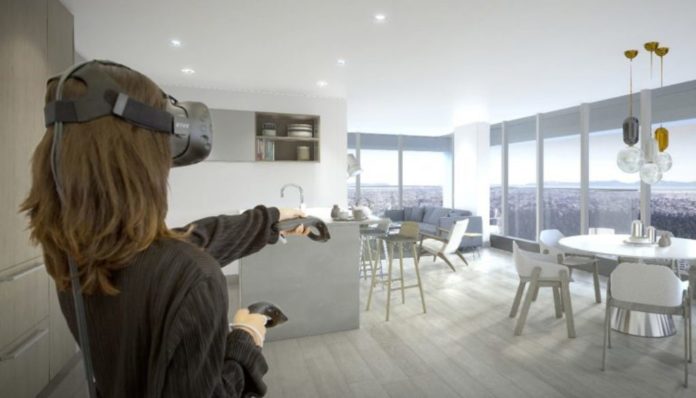
Technology advancements impact every industry, including real estate. The latest innovations are augmented and virtual reality that is changing a lot of industries like healthcare, automotive, retail, real estate, education, and others
The benefits of augmented reality lie in its immersive abilities. These allow users to interact with digital environments. VR separates the users from physical reality and places them in a virtual world. AR enhances its existing reality. There’s also mixed reality, that combines these two both technologies.
One of the industries that benefit from AR/VR incrementally is real estate. These technologies allow us to visualize properties, or immerse people into a visualized prototype of property. Thanks to that AR/VR are definitely considered as one of the most powerful proptech trends according to Softermii article.
Why AR and VR Work for Real Estate
Augmented reality real estate apps shorten buying journeys. They help buyers and sellers navigate this often-tedious process efficiently and smoothly. Augmented reality benefits in real estate include:
- Cost-Effectiveness: Reality real estate apps can transform and replace some traditional marketing initiatives. They provide better ROI while eliminating the costs of property staging.
- Time-Saving: Real estate reality technology allows potential buyers to take a virtual tour from wherever they are at any time.
- Enhanced Customer Experience: AR and VR provide both entertainment and personalization for users. The customer experience is enhanced through virtual tours with interactive add-ons. You can see information about similar properties, use a mortgage calculator, and get real-time descriptions of the neighborhood. Realtors can ensure their clients have information about properties before reaching out and arranging a real visit.
- Accurate and In-depth Analytics Source: Virtual reality real estate technology provides realtors with crucial insights into user behavior while they experience one or another visualization.
- Building of Emotional Connections: A virtual reality real estate tour help your clients visualize the properties. Unlike traditional visits, where everyone is in a rush, potential buyers can take their time with a VR home tour and focus their attention on details.
- Worldwide Reach: Real estate agents know how much time each client requires. Negotiating prices and terms, arranging visits, and showing properties are all time-consuming. You can accommodate more clients when you use VR real estate technology.
AR and VR Applications in Real Estate
AR and VR assist real estate professionals at every stage. Whether it’s renting a property, selling, buying, or building, you can take a VR real estate tour and simplify the process.
Virtual Tours and Property Showcasing
According to a VRARA survey, 40.4% of apartment buyers stated that panoramic tours played an essential role in their purchasing decision. Familiarity with VR real estate platforms should soon be regarded as a requirement for anyone getting into the profession.
Buyers usually look through a list of properties and compare them before making a final decision. By just putting on a headset, clients can virtually examine a house’s interior whenever they want. Thanks to VR buyers can conveniently visit so many properties as they want in a single day. They can also interact with a virtual realtor while they do so.
There are two types of 3D virtual tours. Guided visits are like conventional promotional videos. However, they are either fully virtual or in the form of 360-degree videos. Guided visits are ideal for existing properties because they’re simple to make. All you need is a panoramic camera.
VR real estate tours allow users to choose where to move within a property by clicking on hotspots within their field of view. Creating interactive virtual home tours is more complex. They’re more interactive than guided 3D virtual tours, though, so clients can get the most detail about the property they are considering. Your business can use a real estate VR app to show details of a building that would have once been nearly impossible.
Virtual Advice for Tenants
Immersive technologies can improve communication between tenants and landlords as well. With 3D tours, tenants can learn everything about the property before they arrive or when they can do it personally. They won’t need to continually contact the landlord.
Virtual Staging
A Profile of Home Staging report by the National Association of Realtors stated that 77% of real estate agents agreed that staging helps buyers identify a property as their future home.
By virtually staging a property, you can personalize the staging according to the customer’s lifestyle and preferences. Clients can virtually try to decorate the house by changing wall colors or change the interior design by adding art and furniture.
Virtual Commerce
An augmented reality real estate app allows buyers to take virtual property tours, and at the same time, they can visit online stores, choosing items they want to see how they fit. They can also shop in real-time for the items presented in the virtual home staging.
Immersive technology in real estate is convenient and offers a great return on investment. Certain AR and VR applications are more accessible for real estate professionals, while others are more sophisticated. What is certain, though, is how much the industry is embracing this tech.
Real-Estate AR Marketing
According to ManufacturedHomesMichigan By using AR, customers can learn all the vital information about the properties in which they are interested before contacting a real estate agent. One augmented reality example is Realtor.com. It enables users to determine the price and square footage of a particular property by pointing a smartphone at the building. AR apps can turn a walk or a drive into an insightful real-estate shopping tour.
Designing Interiors With AR/VR
AR/VR technology is helping interior designers visualize how home decor and furniture would look in a particular setting. iOS apps like iStaging limit the costly, time-consuming, trial-and-error process that once existed. They can now use a virtual environment to easily create and try out various designs and styles within a virtual reality home.
Now that you know about virtual reality for real estate, consider using it for your purposes. This technology is only going to become more prominent in the years to come, as virtual reality homes for sale will become the norm.















